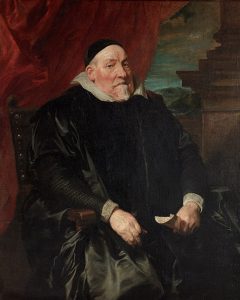Thoughts on Sunday’s Lessons for Oct. 16, 2022
First Reading (Track One): Jeremiah 31:27-34
Pay attention to Sunday’s readings, and watch for a consistent theme: Place your hope in God, be patient and then even when challenges loom, be persistent.

Portrait of a Judge (c.1620), oil painting on canvas by Anthony van Dyck (1599-1641). Musée Jacquemart-André, Paris. (Click image to enlarge.)
In our Track One first reading, we hear Jeremiah pause in his relentless lamentation over the sins of Israel and Judah. The prophet now offers words of hope and the certainty of God’s ultimate love. In a striking metaphor about children’s teeth perceiving the sharp flavor when their parents eat sour grapes, Jeremiah assures us that children will no longer be punished for their parents’ sins. Finally, in words that Jeremiah and his readers surely understood to foretell the restoration of the temple and Israel’s kingdom (but that some Christians also interpret as foreshadowing Jesus) the prophet tells of a new covenant in which everyone will know God and all our sins will be forgiven.
First Reading (Track Two): Genesis 32:22-31
Hear this call through Sunday’s readings: Place your hope in God, and even in the face of challenges, be persistent. In this rather puzzling narrative from Genesis, Jacob fights to a draw in a night-long battle with an angel who doesn’t fight quite fairly, yet turns out to be God. This would have been a shocking development in the culture of its time, because the mere sight of God’s face was believed to be fatal to humans. Not even Moses was allowed to see God face-to-face, but Jacob – now renamed Israel – was able to do so, even while he struggled with God as with any other person.
Psalm (Track One): Psalm 119:97-104
Throughout Psalm 119, the longest of all the Psalms, The psalmist exults in the study and understanding of God’s law, declaring the joy of unity with God through studious meditation and prayer. Now consider this portion the context of Sunday’s Track One first reading, in which Jeremiah declares God’s law central to God’s new covenant, saying: “I will put my law within them, and I will write it on their hearts; and I will be their God, and they shall be my people.” Surely these words were sweeter than honey, as the author of Psalm 119 puts it, to Jeremiah’s people in exile, longing for their home.
Psalm (Track Two): Psalm 121
This is one of the Psalms that we love to hear when we or a loved one or friend is in trouble, fearful, looking for help, uncertain where to turn, seeking protection. Titled “Assurance of God’s Protection” in the New Revised Standard Version, it is one of the Psalms’ most comforting hymns of hope and trust. The Psalmist, not shy about calling out to God, cries out, “From where is my help to come?” We look upward, up to the hills, and find comfort in the sure protection of the Creator, who stands on constant watch, never sleeping, protecting us by night and day.
Second Reading: 2 Timothy 3:14-4:5
This late New Testament letter was written in Paul’s name at a time when the young, increasingly institutional church was facing Roman persecution. Know your scriptures, the writer advises the troubled flock. Even if it’s hard, even if you have to suffer, continue to spread the Gospel’s good news. This message, written for a particular time and place, may come across differently in modern America, when Christians hold a shrinking majority and ideas of Christian nationalism (often interpreted as white Christian nationalism) lure some to use the church to wield power. Of course we are still called to spread the good news. But it should be the Gospel that Jesus taught us: Love God. Love our neighbors. Even love our enemies as we relieve the oppressed and bring good news to the poor.
Gospel: Luke 18:1-8
Luke’s Gospel often shows us Jesus slamming the rich and powerful with parables that burn: The dishonest steward! The rich man who died too soon to enjoy his barns full of treasure! The rich young man who couldn’t give away his property, even to save his soul! The rich man who burned in hell while the poor man he wouldn’t help in life now reposes in heavenly comfort! And now we meet a corrupt and scheming judge confronted by a persistent widow who will not stop demanding until he finally caves in. How are we to read this? At first glance, we might wonder: Is Jesus comparing God to a corrupt judge who won’t do his job? But Jesus is making a different point: Pray day and night, be persistent, and God will listen and quickly respond.
